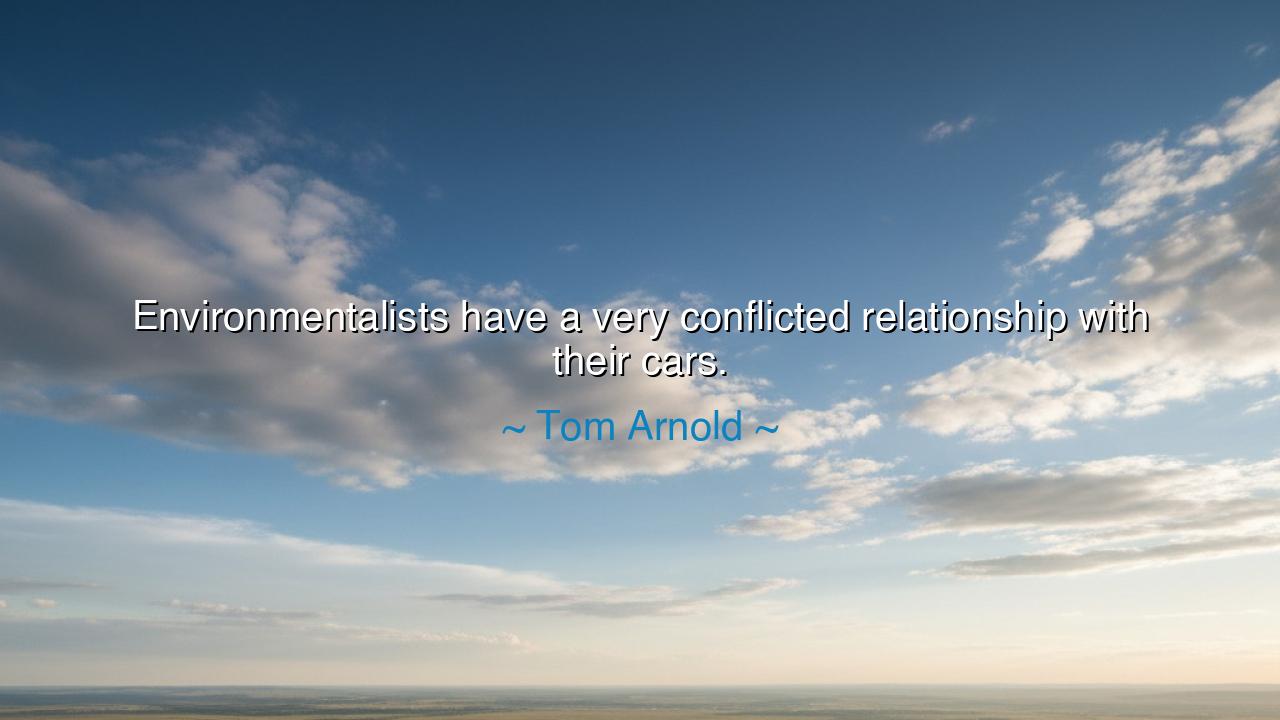
Environmentalists have a very conflicted relationship with their






When Tom Arnold remarks, “Environmentalists have a very conflicted relationship with their cars,” he speaks with a voice both sharp and knowing, revealing the paradox of modern life. His words uncover the struggle of those who strive to guard the earth, yet remain bound to the very tools that wound it. Thus, he unveils the eternal conflict between conviction and necessity, between the purity of belief and the compromise of daily living.
The origin of this saying springs from the age when men first awakened to the cry of the wounded earth. As the call of the environmentalist grew louder, so too did the dependence upon machines of power, swift and convenient. The car, symbol of freedom and progress, also became a symbol of guilt, for each mile driven burned the offerings of the earth and sent smoke into the skies. Arnold captures this tension with simplicity: the battle not of nations, but of the individual heart divided.
The relationship he names is not one of affection alone, but of contradiction. The environmentalist loves the earth, yet relies on the car to move, to labor, to live in a world built upon distance. This duality breeds conflict — a longing for harmony with nature, yet an entanglement with the engines of industry. Such is the burden of modern man: to condemn with the lips what the hands still grasp.
In this brief utterance lies wisdom that transcends the subject of the car alone. It reminds us that ideals often clash with realities, and that purity of purpose is tested in the fire of necessity. To acknowledge this conflict is not hypocrisy, but the first step toward resolution — toward new ways of living that honor both the earth and the needs of its children.
Let the generations after us remember: the path of righteousness is rarely free of contradiction. To live with integrity is not to be untouched by struggle, but to face it with honesty. Arnold’s words endure as a mirror, showing us that even the environmentalist, guardian of the green, must wrestle with the chains of the age. In this struggle lies both burden and hope.






DTBen Do Trong
Tom Arnold’s quote is a reminder of the tension between personal convenience and environmental responsibility. Many environmentalists may feel trapped by the necessity of cars in a world designed for them, but does this conflict highlight the bigger problem? Can we expect individuals to solve environmental issues when the infrastructure and systems around us remain largely unchanged? How can we address this broader issue while still encouraging personal responsibility?
TLThang Le
This quote really makes me think about the complexities of environmentalism. On one hand, environmentalists strive to reduce harm, yet many still use cars, which seem to contradict their beliefs. Is this just human nature, where convenience outweighs ideals in daily life? Or does it suggest that environmental movements need to shift towards creating alternative solutions that are more accessible and practical for everyone?
PNPhuc Nguyen
Tom Arnold’s quote touches on a dilemma many of us face, not just environmentalists. We all have to make choices about our consumption habits, even when those choices conflict with our values. Is it fair to judge environmentalists for using cars when the infrastructure is built around car dependency? Or should we challenge systems that make it difficult to live sustainably, rather than focusing on individual contradictions?
HHungTheSpike
I find this quote thought-provoking because it points out a significant dilemma. Environmentalists often face the challenge of balancing their ideals with practical realities. Can we fully embrace eco-friendly principles when the systems around us are built on unsustainable practices? Maybe the key is not perfection but the effort to reduce harm. How much responsibility should individuals take versus systemic change when it comes to environmental issues?
CTCam Thach
I can see where Tom Arnold is coming from. It’s hard to advocate for environmental sustainability while still depending on a car, especially in cities where alternative transportation options are limited. But do you think it’s possible for environmentalists to reconcile this conflict, or is it just an inherent contradiction in our current infrastructure? Should they aim for a perfect lifestyle, or is it enough to just try to minimize the impact?